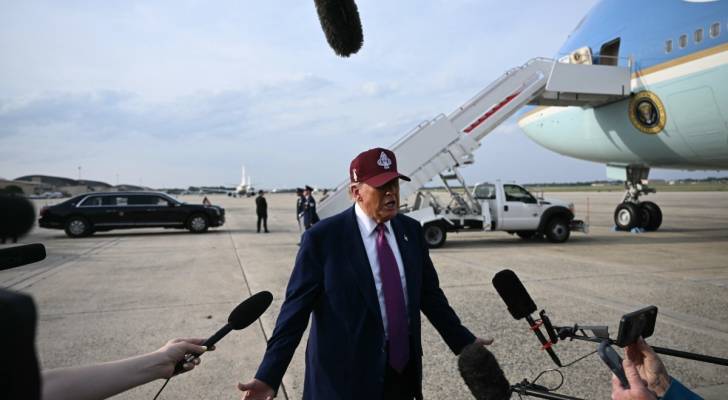US President Donald Trump speaks to reporters after stepping off Air Force One (Credit: AFP)
Trump threatens nationwide troop deployment as protests spread
US President Donald Trump has rapidly expanded the domestic deployment of US military forces, igniting controversy over his use of troops to confront unrest and immigration protests in California.
What began as a surge of active-duty soldiers along the US–Mexico border has since morphed into a sweeping military operation across Los Angeles, where thousands of National Guard troops and even Marines have been mobilized in response to demonstrations against Trump’s aggressive deportation policies.
The decision to deploy federal troops, despite objections from California Governor Gavin Newsom, marks the first time in more than 50 years that a president has bypassed a governor’s consent to mobilize the National Guard. The move has drawn sharp criticism from former military officials, legal scholars, and civil rights advocates who warn that the lines between national defense and political power are being dangerously blurred.
“This is exactly what the American people voted for,” Pentagon spokesman Sean Parnell declared in a social media post, calling the effort a defense of “our people & our homeland.”
Read more: What other US cities joined LA's immigration protests?
But to many observers, the show of force in Los Angeles is about more than public safety.
“He’s trying to break through by mobilizing the Guard in California. And while it’s not illegal, it’s not normal,” said retired Lt. Gen. Russel L. Honoré, who noted that the level of violence did not appear to justify the scale of the response. “He has a political objective to this. To set the conditions and see how far he could go.”
Tensions escalated after Trump authorized the deployment of 2,000 National Guard troops to Los Angeles in response to protests. When state leaders objected, citing adequate local resources, Trump doubled down, sending in Marines and expanding the Guard's mission to include direct support for Immigration and Customs Enforcement (ICE) during deportation raids.
At one point, Trump even supported calls for Governor Newsom’s arrest after his immigration adviser Tom Homan floated the idea publicly. “I would do it if I were Tom,” the president said.
Legal experts are alarmed by Trump’s broad interpretation of executive power, especially his use of a rarely invoked statute, Section 12406 of Title 10, which permits federalization of the National Guard in cases of rebellion. California has filed a lawsuit accusing Trump of overstepping his authority.
“He’s normalizing political involvement by troops and expanding executive power in ways we haven’t seen,” warned Kori Schake, a former Defense Department official now at the American Enterprise Institute. “What worries me most are the normalization of political involvement by troops, and novel and expansive interpretations of executive power.”
The president’s critics say the deployments reflect a deeper trend: Trump’s increasing willingness to use the military for political ends. During a speech at Fort Bragg earlier this week, Trump prompted troops to boo members of the press and promised to “liberate” Los Angeles, a framing more reminiscent of foreign combat zones than American cities.
“It’s not that we haven’t had presidents use the military domestically before,” said Stephen I. Vladeck, a Georgetown University law professor. “It’s that there’s really no history of using those authorities for what really are partisan political purposes.”
Trump, for his part, has made no secret of his intentions. “President Trump promised to carry out the largest mass deportation campaign in American history, and left-wing riots will not deter him in that effort,” said White House press secretary Karoline Leavitt on Wednesday.
The president has also threatened similar military responses elsewhere. “When they do it, if they do it, they’re going to be met with equal or greater force than we met right here,” he told reporters this week, referring to potential protests in other states. He warned that anyone attempting to disrupt a military parade scheduled for Saturday in Washington would be “met with very heavy force.”
Trump has said he is considering invoking the Insurrection Act, an 1807 law that grants the president broad authority to use military force in times of civil unrest. “If there’s an insurrection, I would certainly invoke it,” he said Tuesday. He has also repeatedly labeled protesters as “insurrectionists.”
While the Insurrection Act has been used in the past, by presidents from Abraham Lincoln to George H.W. Bush, experts note that prior uses were based on clear and violent crises, such as civil war or deadly riots. Trump’s critics argue that such a threshold has not been met.
In 2020, Trump floated the idea of invoking the law during protests over the killing of George Floyd, a proposal ultimately rejected by then-Defense Secretary Mark T. Esper. Former aide Stephen Miller also suggested using the statute to turn back migrants at the border, an idea similarly dismissed.
Now, in 2025, Trump appears to be following through on many of those earlier impulses. On his first day back in office, he declared a national emergency at the southern border and ordered the military to assist the Department of Homeland Security in asserting “full operational control.” Since then, the number of active-duty troops along the border has more than tripled.
In a striking move, the Pentagon has designated two strips of land along the southern border, one in New Mexico, another in Texas, as temporary military zones. Migrants who enter these areas can be detained by troops before being turned over to Border Patrol.
Critics see a troubling pattern emerging, one in which the military, long kept apart from domestic politics, is being drawn ever deeper into the president’s pursuit of order and control.
“This could be a precursor to what he wants to do elsewhere around the country,” General Honoré warned.




